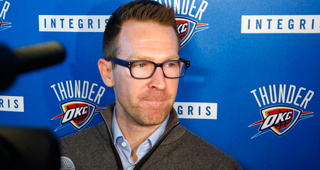The Oklahoma City Thunder have reportedly committed $184 million to Steven Adams and Victor Oladipo.
On the surface, these contract extensions seem hasty. Both were in line to become restricted free agents next summer, meaning the Thunder could simply match any offer sheet proposed by another team, and, in doing so, preserve as much cap space as possible for a July shopping spree.
But according to ESPN’s Zach Lowe, the NBA’s new Collective Bargaining Agreement may muddle that option by increasing cap holds on players coming off their rookie deals by 50-100 percent. This means a team like the Thunder, which was previously working with only about $7 million in space—unless they renounce their free agents (including Oladipo, Adams, and Andre Roberson) and trade Enes Kanter—needs to punt free agency as a vehicle to upgrade their roster. (Notable side effect: OKC can officially kiss Blake Griffin goodbye.)
Instead, Sam Presti’s decision to lock Adams and Oladipo up at a huge price over the next four years makes sense because there’s little opportunity cost. With Russell Westbrook eligible to dip back into free agency in 2018, Oklahoma City needs to stay competitive over the next two years. Since they can’t afford a better center than Adams, or a guard with Oladipo’s combination of athleticism and upside, re-signing those two is their most logical path to floating through the season as a pretty good team.
The downside to these deals is obvious, but we’ll get to those later on. For now, why wait and risk something screwy happening this summer, be it a three-year offer sheet to Adams or a max deal for Oladipo? By inking those contracts today, they get Adams at market value—slightly below a maximum contract—and, pending the type of year Oladipo has, a fair or borderline-bargain agreement with the 2013 draft’s second overall selection.
Three games into the season, Oklahoma City has the league’s third-best defense and second-highest pace—two diametrically opposed statistical rankings that will almost definitely even out as the year goes on. Still, if defense and speed are what the post-Kevin Durant Thunder want their identity to be, Adams and Oladipo are two ideal long-term contributors.
At only 23 years old, Adams is a fantastic fit in just about any system. A rim-running, physical seven-footer with great hands. He’s an excellent screen setter and perfect pick-and-roll partner for Westbrook. Efficient and dependable, Adams showed major growth during last year’s playoff run and may even develop into an effective post scorer through the life of this contract. Losing him was never an option, regardless of how much he cost.
Oladipo's situation is less convincing, particularly as it pertains to how he complements Westbrook. Acquired over the summer in a draft-night deal that sent Serge Ibaka to the Orlando Magic (before Durant signed with the Golden State Warriors), Oladipo has only played three games in a Thunder jersey. He’s a dynamic ball-handler and versatile on-ball defender, but has yet to show in three seasons that he can knock down enough outside shots to keep defenders honest and out of Westbrook’s driving lanes.
He’s only 24 years old, though. There’s still plenty of time for Oladipo to improve his off-ball defensive awareness and three-point stroke. And once Cam Payne’s fractured foot is good to go, Thunder head coach Billy Donovan can tinker with some three-guard lineups that’ll put opposing defenses on their heals.
Even though Oklahoma City doesn’t know for sure if Oladipo can co-exist beside Westbrook’s all-consuming aura, it makes sense to have him under contract. Worst-case scenario, Oladipo’s modest deal gets dangled on the trade market for some established shooting and a draft pick. But let’s not get ahead of ourselves just yet. Continuity can’t be overlooked; there’s real positive benefit to securing a talent like Oladipo for four more years and letting him learn how to play with Kanter, Adams, Payne, Andre Roberson, etc.
It’s unlikely, but there exists a universe in which he or Adams develops into an All-Star-caliber stud over the next couple seasons, too. Even if this doesn’t happen, having so much familiarity between key players, in a league that encourages roster turnover, is valuable—especially for a small-market franchise that isn’t attractive to free agents and too good to garner a top-10 pick.
If the Thunder want to stay competitive and routinely fight for a playoff spot, Westbrook, Oladipo, Adams, Roberson, Kanter and the 20-year-old Domantas Sabonis aren’t a terrible group. But even if Adams and/or Oladipo reach their potential, these deals still put a cap on Oklahoma City’s ceiling while Westbrook is a triple-double-averaging gargoyle.
Oklahoma City’s path to a championship is no easier now than it was before the announcement of these contract extensions. They couldn’t win it all with one of the sport’s all-time greatest scorers. But, even if it’s not entirely the Thunder’s fault, this remains an anticlimactic way to build around a top-five player who, sadly, doesn’t have enough support to give this franchise its first title.



